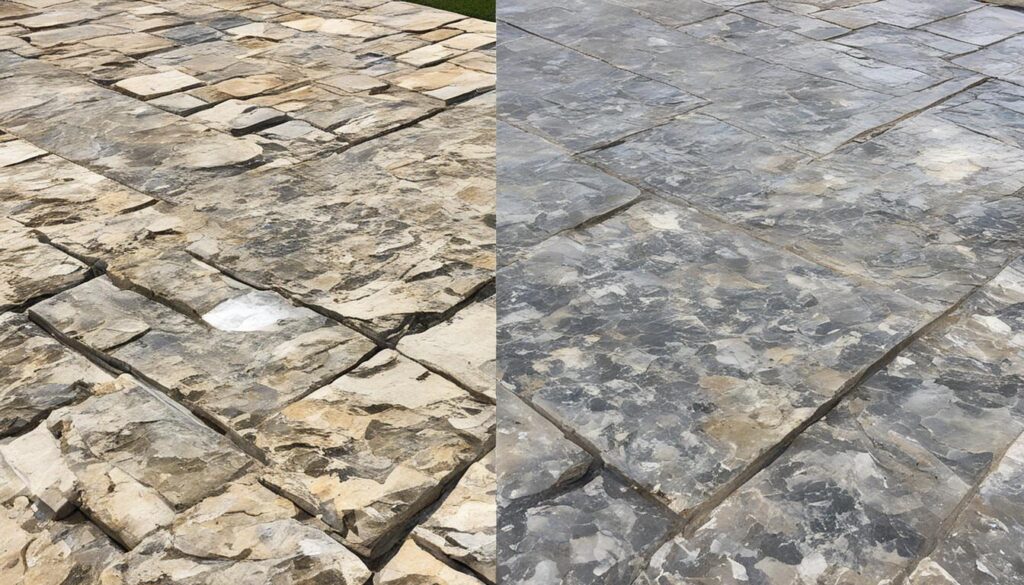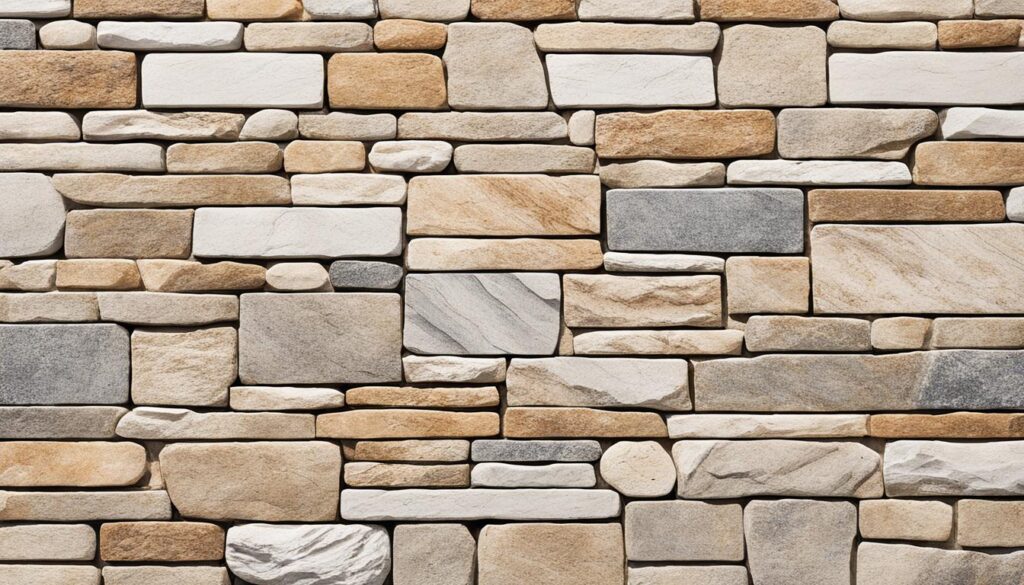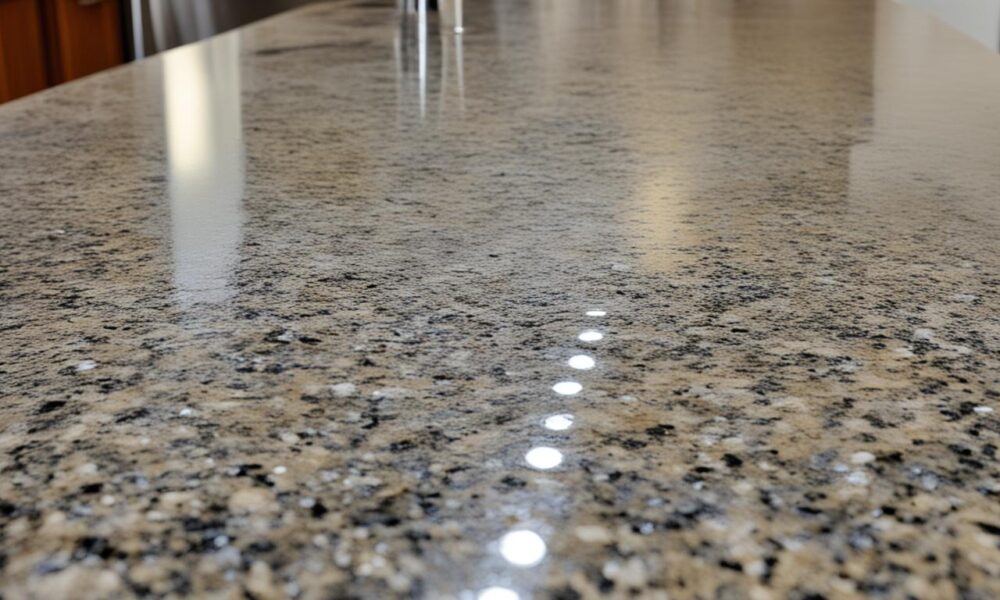Expert Tips for Natural Stone Care & Maintenance
Caring for and maintaining natural stone is essential to preserve its beauty and longevity. With the right care and regular maintenance, your natural stone surfaces can last a lifetime. This article provides expert tips and advice on how to properly clean, maintain, and protect different types of natural stone, such as marble, granite, limestone, travertine, and soapstone. Whether you prefer DIY stone care or professional stone restoration services, this comprehensive guide has everything you need to know to keep your stone pristine and protected.
Key Takeaways:
- Regularly clean natural stone surfaces with pH-neutral cleaners specifically designed for stone.
- Avoid using cleaners containing acid or bleach, as they can damage the stone.
- For deep cleaning, use heavy-duty stone cleaners and degreasers.
- Use stone-specific poultices to remove stains and grout haze.
- Consult a professional stone restoration company for damaged or worn natural stone.
Routine Care for Natural Stone
When it comes to natural stone care, routine maintenance is key to preserving the beauty and longevity of your stone surfaces. Regular cleaning using the right products can help keep your stone looking pristine. Here are some essential tips for maintaining your natural stone:
Cleaning Products and Techniques
When cleaning natural stone countertops and floors, it’s important to use cleaners specifically formulated for stone to prevent damage. Opt for neutral cleaners that have a pH-neutral formula. These cleaners are concentrated and safe for use on stone surfaces without harming any existing sealers or coatings.
Avoid cleaners that contain acid or bleach as they can etch and damage the stone. Acidic cleaners can cause dullness and discoloration, while bleach-based products can strip away the protective sealers. Stick to pH-neutral cleaners to ensure the longevity of your stone surface.
Cleaning Process
To clean your natural stone surface, mix a solution of the pH-neutral cleaner and water according to the manufacturer’s instructions. Apply this solution to the stone surface and gently agitate it with a sponge or soft bristle brush. This will help loosen dirt, grime, and stains.
After scrubbing, use a clean sponge to remove the dirty cleaning solution from the stone surface. Rinse the sponge frequently to prevent smearing dirt back onto the stone. Finally, rinse the stone surface thoroughly with clean water to remove any residue.
Considerations for Textured Stones
Textured stones with irregular surfaces or grooves may require additional cleaning methods. In some cases, using a soft bristle brush or a toothbrush can help reach into the crevices and remove dirt effectively. Be sure to follow the manufacturer’s guidelines and recommendations for cleaning textured stones to avoid any damage or discoloration.
| Tip | Description |
|---|---|
| Use pH-neutral cleaners | Neutral cleaners specifically designed for stone are safe to use and won’t damage the stone surface. |
| Avoid cleaners with acid or bleach | Acidic and bleach-based cleaners can etch and strip away protective sealers, causing damage to the stone. |
| Gently agitate with a sponge or brush | Scrub the stone surface with a soft bristle brush or sponge to remove dirt, grime, and stains. |
| Remove dirty solution with a clean sponge | Using a clean sponge, wipe away the dirty cleaning solution and rinse the sponge frequently to prevent smearing dirt back onto the stone. |
| Rinse thoroughly with clean water | After cleaning, rinse the stone surface with clean water to remove any residue. |
Heavy-Duty Stone Cleaning
In instances where your natural stone requires a deep clean, you can rely on heavy-duty stone cleaning products to effectively remove dirt, grease, grime, waxes, and other stubborn stains without causing damage. These specialized cleaners are designed to provide a thorough deep clean and restore the natural beauty of your stone surfaces.
One such product is the Heavy-Duty Stone Cleaner and Degreaser, a powerful cleaning solution formulated specifically for tackling tough stains and buildup on natural stone. This concentrated cleaner is safe to use on a variety of stone types, including marble, granite, limestone, travertine, and more.
To use the heavy-duty stone cleaner, follow these simple steps:
- Apply the cleaning solution directly to the stone surface.
- Allow the cleaner to sit for the recommended amount of time, ensuring it penetrates the dirt and grime.
- Use a sponge or brush to agitate the solution, loosening the dirt and stains.
- Remove the dirty cleaning solution with a clean sponge to prevent recontamination.
- Rinse the stone surface thoroughly with clean water to ensure all traces of the cleaner are removed.
It’s important to note that different types of natural stone may require varying levels of cleaning intensity. Always refer to the manufacturer’s guidelines and perform a spot test in an inconspicuous area before applying any heavy-duty cleaner. This will help ensure compatibility and prevent potential damage to your stone.
For particularly stubborn stains or heavily soiled areas, you may need to repeat the cleaning process or seek professional stone cleaning services for a more comprehensive deep clean.
Remember, maintaining the cleanliness of your natural stone surfaces not only enhances their appearance but also prolongs their lifespan. Regular deep cleaning, along with routine care and maintenance, will help keep your natural stone looking beautiful for years to come.
| Benefits of Heavy-Duty Stone Cleaners: |
|---|
| Effectively removes dirt, grease, grime, waxes, and other stubborn stains. |
| Safe to use on a variety of natural stone types. |
| Concentrated formula for powerful cleaning action. |
| Restores the natural beauty of stone surfaces. |
| Easy to use with simple application and rinsing process. |
Stain Removal Techniques
Stains can sometimes mar the appearance of natural stone surfaces, but fear not! There are effective stain removal techniques that can restore the beauty of your stone. One such technique is using a stone-specific poultice, which can effectively remove stains and grout haze from both polished and unpolished stone surfaces.
A poultice is a paste-like substance that is applied to the stained area and left to sit for a certain period. It works by drawing out the stain from the stone, leaving it clean and blemish-free. The type of poultice used should be tailored to the specific nature of the stain to ensure optimal results.
In addition to using a poultice, it is crucial to clean up spills as soon as possible to prevent staining, especially on light-colored marble and limestone surfaces. Prompt action can significantly reduce the chances of a stain setting in and becoming more difficult to remove.
It is important to note that using a poultice may temporarily dull the shine of the stone. However, this can be easily remedied by using a stone polish after the stain removal process. Stone polish helps restore the luster and shine of the stone, leaving it looking as good as new.
Key Points:
- Use a stone-specific poultice to remove stains and grout haze from natural stone surfaces.
- Choose a poultice that is suitable for the specific nature of the stain.
- Clean up spills promptly to prevent staining, especially on light-colored marble and limestone.
- After stain removal, restore the shine of the stone by using a stone polish.
Continue reading to learn more about the importance of professional stone restoration services and ongoing maintenance for natural stone.
Restoration for Damaged Natural Stone
If your natural stone has been damaged or is showing signs of wear and tear, it is highly recommended to seek professional stone restoration services. A professional stone restoration company has the expertise and equipment necessary to assess the condition of your stone and perform the required restoration procedures. Whether your stone needs cleaning, polishing, or repair work, these experts can help restore its beauty and integrity.
Stone restoration is a specialized field that requires in-depth knowledge of different stone types and their specific care requirements. By entrusting your damaged stone to a professional, you can have peace of mind knowing that it will be handled with the utmost care and expertise.
Professional stone restoration companies offer a wide range of services to address various stone issues. These services may include:
- Deep cleaning to remove stains, dirt, and grime
- Polishing to restore the stone’s shine and luster
- Repairing cracks, chips, and other forms of damage
- Sealing to protect the stone from future damage
Additionally, stone restoration professionals have access to specialized tools and equipment that are designed specifically for stone care. These tools allow them to achieve professional-level results that may be difficult to replicate with DIY methods.
Benefits of Professional Stone Restoration Services
Opting for professional stone restoration services has several advantages:
- Expertise: Professional stone restoration technicians have extensive knowledge and experience working with a wide variety of natural stones. They understand the unique properties of each stone and can apply the most appropriate techniques and products for restoration.
- Efficiency: A professional stone restoration company has the resources and expertise to complete the restoration process efficiently and effectively. They can save you time and effort compared to attempting to restore the stone on your own.
- Quality Results: Professional stone restoration services are known for delivering high-quality results. These professionals have the skills and tools to achieve precise and meticulous restoration, leaving your stone surfaces looking as good as new.
- Longevity: Properly restored stone surfaces have enhanced durability and longevity. By investing in professional restoration, you can extend the lifespan of your natural stone and enjoy its beauty for years to come.
When selecting a professional stone restoration company, it is essential to choose a reputable and reliable provider. Look for companies with a proven track record, positive customer reviews, and certifications or memberships in industry associations.
By entrusting your damaged natural stone to a professional stone restoration company, you can expect exceptional results and ensure the long-term beauty and integrity of your stone surfaces.

Importance of Sealing Natural Stone
Sealing is an essential step in natural stone care, particularly for newly installed marble, granite, and limestone. Using a high-quality sealer provides maximum stain protection and enhances the longevity of the stone. There are two main categories of sealing products:
- Penetrating/Impregnating Sealers: These sealers provide a natural look and are suitable for polished or honed natural stone countertops. They penetrate the stone, creating a barrier that repels liquids and prevents stains from reaching the surface.
- Stone Enhancer Sealers: These sealers darken and enhance the natural colors of the stone, giving it a rich and vibrant appearance. However, they may also darken seams and joints. Stone enhancer sealers are ideal for bringing out the beauty of textured or porous natural stones.
To choose the right sealer for your stone, consider its specific needs. If you want a natural look, a penetrating/impregnating sealer is recommended. If you want to enhance the colors and textures, a stone enhancer sealer is the way to go. It’s important to follow the manufacturer’s instructions when applying the sealer to ensure effective coverage and maximum protection.
Additionally, it’s crucial to be aware of the acid sensitivity of certain natural stones like marble and limestone. These stones can be etched or damaged by acidic substances. If you plan to install them in environments where acid exposure is likely, take extra precautions and choose an appropriate sealer that offers acid resistance.
Sealing your natural stone surfaces is a proactive measure that safeguards their beauty and quality. It helps prevent stains and discoloration, keeping your stone surfaces looking pristine for years to come.
Comparing Penetrating/Impregnating Sealers and Stone Enhancer Sealers
| Sealer Type | Appearance | Usage | Pros | Cons |
|---|---|---|---|---|
| Penetrating/Impregnating Sealers | Natural | Polished or honed natural stone countertops |
|
|
| Stone Enhancer Sealers | Darkens and enhances colors | Textured or porous natural stones |
|
|
Tips for Ongoing Maintenance and Care
To ensure the long-lasting beauty of your natural stone, ongoing maintenance and care are crucial. By following these tips, you can keep your natural stone looking its best for years to come.
Cleaning
Regular cleaning is essential to remove dirt, dust, and grime from your natural stone surfaces. Use mild, pH-neutral cleaners that are specifically designed for stone. These cleaners effectively clean the surface without causing any damage. Avoid harsh cleaners that contain acids or bleach, as they can etch and dull the stone.
Pro Tip: Always test a small, inconspicuous area of the stone before using any new cleaner to ensure compatibility.
When cleaning, apply the cleaner to the stone surface and use a sponge or soft bristle brush to gently agitate the area. Rinse the surface thoroughly with clean water and dry it with a soft cloth or towel.
Protecting the Stone Surface
Preventing damage to your natural stone is just as important as regular cleaning. Here are some tips to protect your stone surfaces:
- Use coasters and trivets under hot dishes, glasses, or pots to prevent heat damage or scratches.
- Place mats or rugs in high-traffic areas, such as entrances or hallways, to minimize wear and tear on the stone.
- Dust mop regularly to remove abrasive materials that can scratch the surface.
- Use proper vacuum cleaners with non-worn attachments to avoid scratching the stone.
Stain Removal
If a spill occurs on your natural stone, it is essential to clean it up promptly to prevent staining. Blot the spill with a clean cloth or paper towel to absorb the liquid. Avoid wiping, as it can spread the stain.
For different types of stains, there are specific cleaning solutions available:
- Organic Stains: Use a poultice made with a mixture of baking soda and water to draw out the stain. Apply the poultice to the stained area, cover it with plastic wrap, and let it sit overnight. The poultice will absorb the stain, and you can remove it the next day.
- Oil-Based Stains: Use a poultice made with an absorbent material, such as powdered chalk or talc, and a solvent, like acetone or mineral spirits. Apply the poultice, cover it, and let it sit overnight. The solvent will dissolve the oil-based stain, and you can remove the poultice the next day.
- Etch Marks: Etching occurs when acidic substances, such as citrus juices or vinegar, come into contact with the stone surface. To remove etch marks, use a marble polishing powder and follow the manufacturer’s instructions carefully.
Pro Tip: For stubborn stains or if you’re unsure about the best method to remove the stain, it’s recommended to consult a professional stone care provider.
Sealing
Regularly sealing your natural stone is crucial to enhance its stain resistance and protect it from damage. Sealing creates a protective barrier that prevents liquids, oils, and other substances from penetrating the stone.
| Stone Type | Recommended Sealing Frequency |
|---|---|
| Granite | Every 1-2 years |
| Marble | Every 6-12 months |
| Travertine | Every 1-2 years |
| Limestone | Every 1-2 years |
Consult the manufacturer’s recommendations or a stone care professional to determine the best sealing products and frequency for your specific type of natural stone.

Regular maintenance and care will help preserve the beauty and integrity of your natural stone. By following these tips and using the right cleaning products, you can enjoy the timeless elegance of your stone for years to come.
Cleaning and Care for Engineered Stone
Engineered stone surfaces require specific cleaning and care to maintain their beauty and durability. To ensure the longevity of your engineered stone, it is important to follow the manufacturer’s guidelines for proper cleaning, care, and maintenance instructions. These guidelines are specifically tailored to the unique composition and characteristics of engineered stone, providing you with the best practices to keep your surfaces looking their best.
Cleaning Guidelines
When cleaning engineered stone, it is essential to use gentle products that will not damage the surface or compromise its integrity. Water-based and pH-neutral cleaners are generally recommended as they effectively remove dirt and stains without causing any harm. Avoid using aggressive scrubbers or cleaners that contain acidic ingredients, as they can etch or dull the surface of the stone. Instead, opt for mild dish soap and warm water for regular maintenance cleaning.
Protecting Your Surfaces
In addition to regular cleaning, it is important to protect your engineered stone surfaces to maintain their beauty over time. One way to do this is by using appropriate sealers, which act as a barrier against stains and spills. Refer to the manufacturer’s guidelines to determine the best sealer for your specific engineered stone, as different products may have varying recommendations. By applying a high-quality sealer, you can enhance the stain resistance of your engineered stone and prevent any potential damage.
Promptly Addressing Stains and Issues
If you encounter any stains or issues on your engineered stone surfaces, it is crucial to address them promptly. Depending on the type of stain or problem, specific cleaning techniques or products may be required. Refer to the manufacturer’s guidelines or seek professional advice to ensure you are using the most suitable methods for stain removal, as well as the appropriate products for your specific engineered stone. Taking immediate action can help prevent the stain from setting in and ensure the continued beauty of your surfaces.
To summarize, cleaning and maintaining engineered stone requires following specific guidelines set by the manufacturer. By using gentle cleaners, protecting your surfaces with sealers, and addressing stains and issues promptly, you can keep your engineered stone looking pristine and extend its lifespan.
Addressing Stains and Problems with Natural Stone
If you encounter stains or problems with your natural stone, it is essential to address them appropriately. Surface stains can often be removed by using suitable cleaning products or household chemicals. For deeper stains, surface scratches, or etching, it is recommended to seek the assistance of a professional stone care provider. They have the expertise and tools to effectively remove stains, repair scratches, and restore the natural beauty of your stone. It is important to identify the cause of the stain or problem to ensure proper treatment.
When it comes to stain removal, there are various cleaning products available in the market that are specifically designed for natural stone care. These products are formulated to target different types of stains, such as organic stains, oil-based stains, or mineral stains. It’s important to choose a product that is compatible with your specific type of natural stone and follow the instructions provided by the manufacturer.
For surface scratches and etching, professional stone care providers have the expertise to assess the damage and determine the most appropriate method for repair. They may use specialized equipment and techniques, such as diamond polishing and honing, to restore the damaged area. It’s crucial to consult a stone care professional to ensure that the repair process is carried out safely and effectively.
By addressing stains and problems with natural stone promptly and seeking the help of a stone care professional when necessary, you can maintain the beauty and integrity of your stone surfaces for years to come.
Expert Tip: Identifying the Cause of Stains
When dealing with stains on natural stone, it’s important to identify the cause of the stain. This can help determine the most effective method for removal and prevent future occurrences. Common causes of stains include food and beverage spills, oil-based substances, and the use of improper cleaning products. By understanding the source of the stain, you can take preventive measures and ensure the long-term care of your natural stone.
| Stain Type | Cause | Prevention |
|---|---|---|
| Food and Beverage | Spills from coffee, wine, sauces, etc. | Use coasters and clean spills immediately |
| Oil-Based | Grease, cooking oils, cosmetics, etc. | Regularly clean and avoid contact with oily substances |
| Improper Cleaning | Use of acidic or abrasive cleaners | Follow manufacturer’s recommendations and use pH-neutral cleaners |
Conclusion
Proper care and maintenance are essential for preserving the beauty and longevity of natural stone. By following expert tips, using suitable cleaning products, and regularly sealing your stone, you can ensure that it remains pristine and protected. Whether you choose to DIY your stone care or seek professional stone restoration services, the key is to address any issues promptly and use appropriate techniques and products to keep your natural stone looking its best. With the right care, your natural stone surfaces can provide a lifetime of beauty and enjoyment.
Remember to regularly clean your natural stone surfaces using pH-neutral cleaners and avoid using harsh chemicals that can damage the stone. Implement preventive measures like using coasters and trivets to protect the stone from heat or spills. Additionally, promptly clean up any spills or stains to prevent permanent damage.
For those who prefer a DIY approach, ensure you understand the specific care requirements for the type of natural stone you have. Invest in high-quality stone cleaning products and learn proper sealing techniques to enhance stain resistance and protect your stone from damage. However, if you encounter deep stains, surface scratches, or other issues, it is recommended to seek the expertise of a professional stone care provider for the best results.



